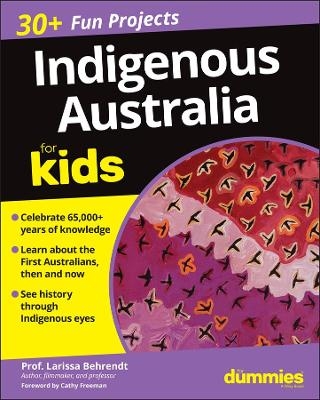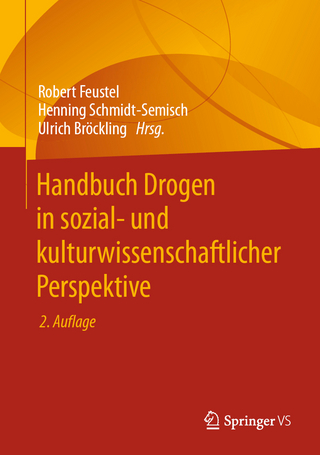
Indigenous Australia For Kids For Dummies
For Dummies (Verlag)
978-0-7303-9033-6 (ISBN)
Indigenous Australia For Kids For Dummies is here to enlighten you about the history, struggles and triumphs of the diverse peoples that make up Australia’s Indigenous communities. Did you know that Australia is home to the world’s oldest culture? Experience 60,000 years of history and culture, plus, get right up-to-the-minute, with amazing facts about Indigenous sports and entertainment figures and info on what matters to Indigenous peoples today.
This interactive book has loads of features that will engage and excite readers aged 10-15 years old – and their teachers and parents! Featuring profiles of celebrated Indigenous people like Cathy Freeman and Albert Namatjira, as well as fun research projects and hands-on activities that bring Indigenous Australia to life. Ever wanted to connect with your local Indigenous communities? This book will give you ideas about how you can connect with First Nations peoples and other interactive ways to extend your learning out of the book.
Discover the rich culture, long history and special values of the world’s oldest race
Learn about Indigenous art, song, dance, literature and contributions to contemporary Australia
Impress friends and family with your knowledge of Australian colonisation and Indigenous rights
Figure out what’s going on in the lives of Indigenous Australians today – and bust the most common myths
This book is perfect for young readers who want to appreciate and understand the diverse, proud, and fascinating peoples that make up Australia's Indigenous communities.
Professor Larissa Behrendt is Distinguished Professor of the Jumbunna Institute of Indigenous Education and Research at the University of Technology, Sydney. An award-winning author and director, she is also the host of Speaking Out on ABC Radio.
Foreword by Cathy Freeman xi
Introduction 1
About This Book 1
Foolish Assumptions 2
Icons Used in This Book 3
Where to Go from Here 3
Part 1: An Ancient People: Then and Now 5
Chapter 1: Understanding Indigenous Australia 7
Indigenous Cultures: Then and Now 8
There Goes the Neighbourhood 11
Fighting Back 13
New Problems for an Old Culture 16
Doing It for Ourselves 18
Chapter 2: Rich Past, Strong Traditions 19
The First Australians 20
65,000 Years of Tradition 21
Aboriginal and Torres Strait Islander Populations Today 24
A Note about the Torres Strait Islands 30
Saying G’Day 32
Opening an Event: Welcome to Country 34
Defining the Identity of an Aboriginal Person or a Torres Strait Islander 37
Chapter 3: A Land of Cultural Diversity 43
Exploring the Indigenous Relationship to Land 44
Celebrating Cultural Diversity 46
Kinship and Totemic Systems 49
Talking Languages 52
Coming Together 56
Maintaining Links to Traditional Country 58
Chapter 4: Traditional Cultural Values and Practices 63
Going Back to the Dreamtime 64
Indigenous Worldviews 68
Living with Nature 71
Looking to the Skies 79
Controlling the Environment 80
Modern Cultural Values 82
Caring for Country 84
Part 2: Invasion 85
Chapter 5: First Contacts 87
Looking for the Unknown Southern Land: Contact before 1770 88
Landing in Australia: Cook’s Arrival 91
Establishing a British Colony 95
Seeing through Indigenous Eyes: Perspectives on the Arrival 95
Chapter 6: The Brits’ First Colony: 1788 97
Captain Phillip and the First Fleet 98
Starting a Penal Colony 100
Seeing How the Locals Dealt with the New Arrivals 104
Chapter 7: The Loss of People and the Land 113
Opening Up the Land: White Settlement Spreads 114
Spreading Disease Far and Wide 114
Meeting Aboriginal Resistance 115
Growing the British Colony 120
Dealing with Frontier Conflict 127
Ignoring Prior Ownership: No Treaties 138
Chapter 8: Taking the Children 141
Examining the Ideology of Assimilation 142
Rules for the Removal Policy 146
Acknowledging the Stolen Generations 150
Unfinished Business: Reparations and Compensation 156
Part 3: Indigenous Activism 165
Chapter 9: Citizenship Rights and a Referendum 167
Early Claims to Better Treatment 168
British Subjects, but Not Quite 173
Leaving Indigenous People Out of the Constitution 177
War Heroes: Frontier Wars and Beyond 180
Still Denied Equality 185
Not Taking It Lying Down 187
Steps towards Equality 190
The Freedom Ride 190
The Referendum is Announced 194
Chapter 10: From Apology to Uluru 199
A New Government — A New Era? 200
The Intervention Continues 204
Finding a National Voice 209
Part 4: Contemporary Indigenous Cultures 215
Chapter 11: Indigenous People and Sport 217
A (Traditional) Sporting Life 218
Playing Them at Their Own Games 222
Slipping on the Whites: Cricket 224
Stepping Up in the Boxing Ring 227
We Love Our Footy! 232
Track and Field 246
Championing Other Sports 248
Chapter 12: More Than Rocks and Dots: Indigenous Art 255
Understanding the Role of Art in Indigenous Cultures 256
Looking at Indigenous Art around Australia 260
Examining Torres Strait Islander Art 269
Thinking about Urban Indigenous Art 271
Indigenous Art as a Means to an Economic End 276
Chapter 13: Singing and Dancing 281
Traditional Expression through Music and Dance 282
Carrying a Tune: Contemporary Indigenous Music 286
Jumping into Modern Indigenous Dance 297
Chapter 14: Indigenous Literature: We’ve Always Been Storytellers 305
Moving from Oral to Written Traditions 306
Writing about the ‘Aborigine’ in Australian Literature 307
Establishing Indigenous Literature 313
Not Putting Your Foot in It! 317
Chapter 15: Performance Storytelling: Film, Theatre and Television 321
Acting the Part: Indigenous People and the
World of Films 322
Taking Over the Camera 329
Treading the Black Boards 338
Appearing on Mainstream Screens 344
Part 5: Dealing with Current Issues 359
Chapter 16: Closing the Gap and the Way Forward 361
Looking Back at Past Government Policies 362
Closing the Gap Reboot 367
Examining Health Issues 370
Looking at Housing Problems 372
Learning about Education Issues 375
Working on Employment Problems 383
No New Stolen Generations: Keeping Indigenous Children with Their Families 388
Chapter 17: Doing It for Ourselves 391
Self-Determination: More Than a Principle 391
Groups for Self-Representation 392
Working within the Existing Process 395
Part 6: The Part of Tens 399
Chapter 18: Ten Important Indigenous Cultural Sites 401
Uluru, Northern Territory 401
Kata Tjuta, Northern Territory 402
Nitmiluk, Northern Territory 402
Windjana Gorge, Western Australia 403
Daintree Rainforest, North Queensland 403
Mungo National Park, New South Wales 404
Yeddonba, Victoria 404
Ngaut Ngaut, South Australia 405
Wybalenna, Tasmania 405
The Aboriginal Tent Embassy, Canberra 405
Chapter 19: Ten Indigenous Firsts 407
The First Indigenous Australian to Visit Great Britain: 1793 407
The First Indigenous Cricket Team Tour: 1868 408
The First Indigenous ‘Pop Star’: 1963 409
The First Indigenous Person to Be Australian of the Year: 1968 409
The First Indigenous Person to Be Elected to the Australian Parliament: 1971 410
The First Indigenous Lawyer: 1976 410
The First Indigenous Person to Make a Feature Film: 1992 411
The First Indigenous Surgeon: 2006 412
The First Indigenous Senior Council (SC): 2015 412
The First Indigenous Minister for Indigenous Australians: 2019 413
Chapter 20: Ten Myths about Indigenous People 415
‘Indigenous People Have a Problem with Alcohol’ 415
‘Indigenous People Are Dying Out’ 416
‘Indigenous People Who Live in Urban Areas Have Lost Their Culture’ 416
‘Indigenous People Were Killed Off in Tasmania’ 416
‘Indigenous People Are Addicted to Welfare’ 417
‘Too Much Money is Spent on Indigenous People’ 417
‘Real Indigenous People Live in Remote Areas’ 418
‘Indigenous Groups Don’t Handle Money Well’ 419
‘Indigenous Culture is Violent’ 419
‘Indigenous Self-Determination Has Been Tried but It Has Failed’ 419
Glossary 421
Index 427
| Erscheinungsdatum | 23.11.2021 |
|---|---|
| Vorwort | Cathy Freeman |
| Sprache | englisch |
| Maße | 19 x 23 mm |
| Gewicht | 794 g |
| Themenwelt | Sozialwissenschaften ► Soziologie |
| ISBN-10 | 0-7303-9033-0 / 0730390330 |
| ISBN-13 | 978-0-7303-9033-6 / 9780730390336 |
| Zustand | Neuware |
| Haben Sie eine Frage zum Produkt? |
aus dem Bereich


